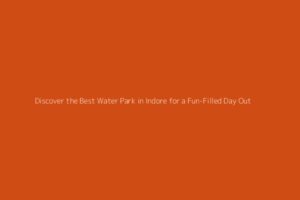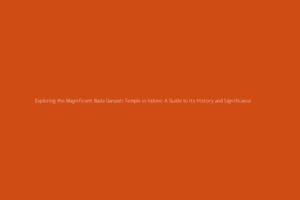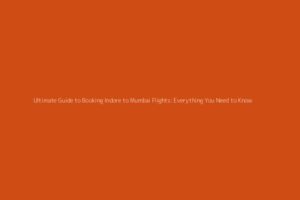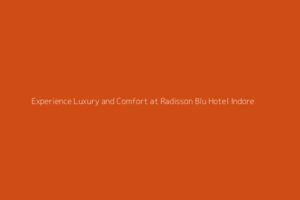Table of Contents
Introduction
Indore, located in the state of Madhya Pradesh, India, holds significant prominence as a bustling city. Situated in the western part of the state, Indore serves as a major center for commerce, education, and culture. With a rich historical background and a thriving present, Indore continues to attract visitors and residents alike. The city boasts a vibrant atmosphere, diverse communities, and a robust economy, making it a hub of activity and opportunity. From its historical landmarks to its modern infrastructure, Indore showcases a blend of tradition and progress. With its strategic location and continuous development, Indore stands as a testament to the dynamic spirit and potential of Madhya Pradesh.
Historical Background
Indore witnessed its establishment and subsequent development as a prominent city in Madhya Pradesh, India. The origins of Indore can be traced back to the 16th century when it was a small trading hub on the banks of the Saraswati River. It gradually gained significance under the Holkar dynasty, led by Malhar Rao Holkar. During the 18th century, Indore emerged as a princely state under the rule of the Holkars, who played a vital role in shaping its destiny. The Holkars established themselves as prominent rulers and patrons of arts and culture. Under their reign, Indore experienced a period of prosperity and witnessed the construction of magnificent palaces, temples, and other architectural marvels. In the early 19th century, Indore came under the influence of British colonial rule, becoming a part of the Central India Agency. The city served as an important administrative center, contributing to the growth of trade and commerce. It also played a significant role during the Indian independence movement, with notable freedom fighters and activists emerging from its soil. Following India's independence in 1947, Indore became a part of the newly formed state of Madhya Bharat and later Madhya Pradesh. Over the years, Indore has experienced rapid urbanization, infrastructure development, and industrial growth. Today, it stands as a thriving metropolis and a major commercial and educational hub in central India. The historical background of Indore reflects its evolution from a small trading settlement to a bustling city with a rich cultural heritage and a blend of architectural styles. The contributions of various rulers and the city's resilience have shaped Indore into the vibrant and dynamic city it is today.
Geographic Features
The city is nestled in the western part of Madhya Pradesh, bordered by the Malwa Plateau. Rolling hills and fertile plains surround Indore, creating a picturesque landscape. The region benefits from its strategic location on the southern edge of the central Indian plains, providing easy access to neighboring states and cities. Indore experiences a subtropical climate characterized by hot summers and cool winters. The summers, spanning from March to June, are typically hot with temperatures often soaring above 40 degrees Celsius (104 degrees Fahrenheit). Monsoon season arrives in July and continues until September, bringing moderate to heavy rainfall, which is vital for agriculture and sustains the lush greenery of the region. The winter months, from November to February, offer a pleasant respite with mild temperatures ranging from 10 to 20 degrees Celsius (50 to 68 degrees Fahrenheit). The city is dotted with several water bodies, including the Khan and Saraswati rivers, which flow through its outskirts. These rivers not only enhance the city's natural beauty but also play a crucial role in supporting agricultural activities in the surrounding areas. Indore's topography showcases a mix of plains, gentle slopes, and small hills, offering scenic views and ample opportunities for recreational activities. The terrain serves as a canvas for various parks, gardens, and green spaces within the city, providing residents and visitors with tranquil retreats from urban life. Overall, the geographic features of Indore, including its location, climate, rivers, and diverse topography, contribute to the city's charm, natural beauty, and favorable conditions for both residents and tourists to enjoy.
Demographics
In Indore, a vibrant city in Madhya Pradesh, India, various statistics and information shed light on its population, ethnicity, languages spoken, and religious composition. The population of Indore comprises a diverse mix of individuals from different backgrounds and communities. As per recent data, the city is home to a significant population of over 3 million residents. The population continues to grow steadily due to factors such as urbanization, employment opportunities, and educational institutions. Indore exhibits a rich ethnic fabric, with people from various ethnicities residing in the city. While the majority of the population consists of indigenous ethnic groups native to Madhya Pradesh and neighboring regions, Indore's cosmopolitan nature also attracts people from different parts of India, resulting in a diverse ethnic blend. Languages spoken in Indore reflect the linguistic diversity of the region. Hindi, the official language of India, is widely spoken and understood by a majority of the population. Additionally, Malwi, a regional dialect of Rajasthani, holds significant influence and is spoken by a substantial number of people. English is also commonly spoken, particularly in educational institutions, businesses, and urban areas, as it serves as a lingua franca for communication and commerce. Regarding religious composition, Indore embraces a harmonious coexistence of various faiths. Hinduism is the predominant religion, with a substantial Hindu population practicing different sects and traditions. Islam is the second-largest religion in the city, followed by a significant population of Muslims. Other religious communities, including Jainism, Sikhism, Christianity, and Buddhism, are also present, contributing to the religious diversity of Indore. Indore's population, characterized by its diversity in ethnicity, multilingualism, and religious pluralism, fosters a multicultural environment, promoting intercultural interactions and a rich tapestry of traditions and beliefs.
Cultural Heritage
The rich cultural heritage of Indore encompasses a vibrant tapestry of traditional art, music, dance, festivals, and cuisine, offering a glimpse into the city's captivating cultural landscape. Indore proudly showcases traditional art forms that have flourished through the ages. Local artisans skillfully create intricate handicrafts, including metalwork, woodwork, pottery, and textile weaving. These art forms reflect the city's artistic prowess and are often celebrated for their exquisite craftsmanship and attention to detail. Music holds a special place in Indore's cultural heritage, with a legacy of classical and folk traditions. Renowned musicians and singers have emerged from Indore, contributing to the city's rich musical legacy. The city reverberates with melodious tunes from classical Hindustani music to vibrant folk songs, creating an enchanting atmosphere. Dance forms an integral part of Indore's cultural fabric, with various traditional dance styles flourishing in the region. From the graceful movements of Kathak to the energetic beats of Garba and the expressive storytelling of Kalbelia, dance forms in Indore captivate audiences and convey narratives rooted in tradition and folklore. Indore celebrates a multitude of festivals throughout the year, reflecting the city's cultural diversity and religious harmony. Festivals like Diwali, Holi, Eid, Navratri, and Christmas are celebrated with great enthusiasm and fervor. These festivities bring together people from different communities, fostering unity and mutual respect. Indore's cuisine is a delightful fusion of flavors and culinary traditions. The city is renowned for its delectable street food, offering a gastronomic adventure for food enthusiasts. From the spicy flavors of poha, jalebi, and samosa to the savory delights of kebabs and biryanis, Indore's cuisine tantalizes the taste buds and showcases the city's culinary heritage. The rich cultural heritage of Indore, showcased through traditional art, mesmerizing music, captivating dance forms, vibrant festivals, and mouthwatering cuisine, creates a tapestry of experiences that enthralls both residents and visitors, making Indore a cultural hub that celebrates its heritage with pride and passion.
Economy and Industries
Indore, a city in Madhya Pradesh, India, boasts a robust economic profile with diverse industries, thriving businesses, active trade, and ample employment opportunities. The city's economic landscape encompasses a range of key industries. Manufacturing plays a significant role in Indore's economy, with sectors such as textiles, garments, pharmaceuticals, automobile components, and machinery contributing to its industrial prowess. Indore is also emerging as a hub for Information Technology (IT) and Business Process Outsourcing (BPO) services, attracting both domestic and international companies. Indore serves as a thriving commercial center, with a bustling business ecosystem. The city is home to numerous businesses, including small and medium enterprises (SMEs) as well as large corporations. These businesses span various sectors such as retail, real estate, hospitality, healthcare, education, and financial services. Indore's entrepreneurial spirit is evident in the thriving startup culture, with several startups gaining recognition and making significant contributions to the economy. Trade plays a vital role in Indore's economic growth. The city is strategically located, serving as a key trading hub for central India. Indore's well-developed infrastructure, including its connectivity through road, rail, and air networks, facilitates efficient movement of goods and services. The wholesale market in Indore, known as Sarafa Bazaar, is renowned for its vibrant trading of commodities like gold, silver, and jewelry. Indore offers a plethora of employment opportunities, attracting job seekers from across the region. The city's diverse industrial base and thriving business ecosystem generate employment across various sectors, contributing to both skilled and unskilled job opportunities. Additionally, Indore's educational institutions produce a pool of talented graduates, supporting the city's workforce requirements. The economic profile of Indore showcases a dynamic city that thrives on its diverse industries, thriving businesses, active trade, and ample employment prospects. The city's economic growth, driven by manufacturing, services, trade, and entrepreneurship, positions Indore as a key economic center in Madhya Pradesh and a hub of opportunity and innovation.
Education and Research
The educational landscape in Indore, Madhya Pradesh, India, is characterized by a multitude of prominent educational institutions, research centers, and initiatives, fostering a conducive environment for learning and innovation. Indore is home to several esteemed educational institutions across various disciplines. Reputed universities, such as Devi Ahilya Vishwavidyalaya (DAVV), offer a wide range of undergraduate and postgraduate programs, covering fields such as arts, sciences, commerce, engineering, management, and law. These universities attract students from different parts of the country and provide them with quality education and research opportunities. The city is also known for its specialized institutes and colleges. Prestigious institutions in fields like medicine, engineering, and management have gained recognition for their academic excellence. For instance, Mahatma Gandhi Memorial Medical College, Shri Govindram Seksaria Institute of Technology and Science (SGSITS), and Indian Institute of Management Indore (IIM Indore) are esteemed institutions that contribute significantly to their respective fields. Indore is also home to several research centers and institutes that promote scientific inquiry and technological advancements. These research institutions facilitate cutting-edge research in various domains, including biotechnology, agriculture, information technology, and pharmaceuticals. They provide a platform for scholars, scientists, and researchers to collaborate and make significant contributions to their respective fields. Furthermore, Indore embraces various educational initiatives aimed at promoting innovation, entrepreneurship, and skill development. Incubation centers and startup initiatives nurture entrepreneurial spirit among students and provide resources and mentorship to aspiring entrepreneurs. These initiatives encourage students to translate their ideas into practical solutions and contribute to the economic growth of the city. The educational landscape in Indore, with its prominent educational institutions, research centers, and initiatives, offers a nurturing ecosystem for students, researchers, and innovators. The city's commitment to education and research paves the way for intellectual growth, fosters innovation, and contributes to the overall development of Indore as a knowledge-driven city.
Infrastructure and Urban Development
An examination of Indore's infrastructure, transportation systems, urban planning, and recent development projects reveals the city's commitment to modernization and sustainable growth. Indore has undergone significant infrastructure development in recent years. The city boasts well-maintained roads, including national highways and state highways, facilitating smooth connectivity within and beyond its boundaries. The construction of flyovers, bridges, and underpasses has improved traffic flow and reduced congestion in key areas. Additionally, the city has witnessed the development of modern infrastructure, including commercial complexes, residential townships, and public amenities, catering to the needs of its growing population. Transportation systems in Indore have been continually upgraded to enhance connectivity and improve mobility. The city operates a well-connected public transportation network, including buses, auto-rickshaws, and taxis, providing convenient options for commuting. Indore also launched an ambitious bus rapid transit system (BRTS) called iBus, which has transformed public transport by providing dedicated bus lanes and efficient services. Moreover, the city has taken initiatives to promote sustainable transportation, such as the implementation of bike-sharing programs and the development of cycling tracks. Urban planning plays a crucial role in shaping Indore's development. The city has witnessed strategic urban planning initiatives to ensure efficient land use, environmental sustainability, and balanced growth. Efforts have been made to develop residential areas, commercial zones, and industrial estates in a planned manner. Indore's urban planning aims to create well-designed neighborhoods with access to essential services, green spaces, and recreational facilities. Indore has also seen the implementation of several recent development projects. These projects focus on various aspects, such as infrastructure enhancement, beautification, and smart city initiatives. For instance, the city has witnessed the construction of modernized railway stations, the development of smart parking systems, the introduction of LED street lighting, and the implementation of waste management and recycling programs. These initiatives aim to improve the quality of life for residents and enhance the city's overall sustainability. Through its focus on infrastructure development, transportation systems, urban planning, and recent development projects, Indore demonstrates its commitment to creating a modern and livable city. The city's efforts toward sustainable growth and improved urban services contribute to its reputation as a progressive and forward-thinking urban center.
Tourist Attractions
Let's take a look at the showcase of popular tourist destinations in Indore, including historical monuments, religious sites, parks, and museums, all of which contribute to the city's allure and cultural significance. One of the notable historical monuments in Indore is the Rajwada Palace. This majestic palace, known for its architectural grandeur, stands as a testament to the city's royal heritage. With its mix of Maratha, Mughal, and European styles, the palace showcases intricate carvings, ornate balconies, and a captivating blend of architectural influences. Indore is also home to several religious sites that attract visitors from near and far. The Kanch Mandir, also known as the Glass Temple, is a unique Jain temple adorned with mirrors and glasswork, creating a mesmerizing effect when light reflects off its surfaces. Another revered religious site is the Bada Ganpati, housing one of the largest Ganesh idols in the world. Devotees flock to this temple to seek blessings and witness the impressive craftsmanship of the idol. For those seeking natural beauty and tranquility, Indore offers a range of parks and gardens. Lal Bagh Palace, a sprawling estate with manicured lawns, lush gardens, and a museum, provides a serene retreat for visitors. Pipliyapala Regional Park, also known as Indore's Miniature Sea, features a scenic lake, beautiful landscapes, and an array of attractions, including an amusement park and a musical fountain. Indore is home to several museums that showcase its rich history and culture. The Central Museum, housed in a heritage building, exhibits an extensive collection of artifacts, including sculptures, coins, and paintings, providing insights into the region's heritage. The Holkar Cricket Stadium Museum offers a unique experience for cricket enthusiasts, displaying memorabilia and showcasing the city's passion for the sport. These popular tourist destinations in Indore, ranging from historical monuments and religious sites to parks and museums, offer visitors a diverse range of experiences. The city's cultural heritage, natural beauty, and architectural marvels make it an enticing destination for travelers seeking a blend of history, spirituality, and leisurely exploration.
Sports and Recreation
Indore boasts a vibrant sports culture, encompassing a range of sports facilities, hosting notable events, and achieving significant milestones in the realm of sports. The city of Indore is home to several prominent sports facilities that cater to various disciplines. The Holkar Cricket Stadium, with a seating capacity of over 30,000 spectators, stands as one of the premier cricket grounds in India. It has hosted numerous domestic and international cricket matches, including Indian Premier League (IPL) games, attracting cricket enthusiasts from all over. Indore also offers facilities for other sports, such as football, hockey, badminton, tennis, and athletics. The Nehru Stadium serves as a multi-purpose sports complex, hosting football and hockey matches, as well as athletic events. The city is also equipped with indoor stadiums and sports complexes that provide infrastructure for indoor sports and training facilities for athletes. Indore has been a venue for various significant sporting events, garnering national and international attention. The city has hosted matches of the prestigious Ranji Trophy, India's premier domestic cricket tournament. Furthermore, it has been a preferred destination for hosting matches during the Indian Premier League (IPL), contributing to the city's reputation as a cricketing hub. In recent years, Indore has witnessed remarkable achievements in sports. The city has produced talented athletes who have excelled in various disciplines. The sports culture in Indore extends beyond professional sports. The city encourages grassroots development and promotes sports at the community level. Schools, colleges, and local sports clubs actively participate in organizing tournaments and competitions, nurturing young talent and instilling a love for sports among the youth. Overall, Indore's sports culture thrives through its state-of-the-art facilities, hosting significant events, and the achievements of its athletes. The city's passion for sports, evident in its stadiums, tournaments, and sporting accomplishments, contributes to its reputation as a vibrant sports destination and a nurturing ground for sporting talent.
Notable Personalities
- Devi Ahilya Bai Holkar, most noted ruler of Holkar State; built numerous temples, wells and dharamshalas all over India; spent most of her life in Maheshwar, then capital of the Holkars, situated on the banks of the Narmada and is said to have visited Indore only twice in her lifetime; her name is synonymous with Indore and the university and airport are named after her
- Maharaja Yashwantrao Holkar, key figure in Maratha history; galvanized several years of resistance against the British Empire; called the Napoleon of India
- Yeshwantrao Holkar II (born 1908), the Maharaja of Indore belonging to the Holkar dynasty of the Marathas; born in Indore
- Field Marshal Sam Bahadur Manekshaw, Commandant of the Infantry School, Mhow during the 1950s
- Field Marshal K. M. Cariappa, first Indian Commander-in-Chief of the Indian Army; studied at Daly College, Indore
- General K. Sundarji, Commandant of the College of Combat, Mhow (now known as Army War College) during the early 1980s
- Air Chief Marshal Shashindra Pal Tyagi, Chief of the Air Staff of the Indian Air Force, 2004–2007
- Jyotiraditya Scindia, Indian Politician, former President of MPCA, Hereditary Patron of Daly College, Indore
- Sumitra Mahajan, Bharatiya Janata Party (BJP) Leader and MP; Member of Parliament from Indore Lok Sabha constituency since 1989 and lok sabha speaker
- Digvijay Singh, Indian politician; former Chief Minister of Madhya Pradesh; senior leader of the Indian National Congress political party; studied at Daly College in Indore; alumnus of Shri Govindram Seksaria Institute of Technology and Science, Indore
- Kailash Vijayvargiya - A heavyweight leader of Indore BJP, currently serving as General Secretary of the Bharatiya Janata Party (BJP)
- Satyanarayan Patel, a senior leader of Indian National Congress party
- Afroz Ahmad is member in Government Of Indian appointed by Prime Minister of India
- Homi F. Daji, member of the 3rd Lok Sabha of India. He represented the Indore constituency of Madhya Pradesh and was a member of the Communist Party of India.
- Ramesh Mendola, Bharatiya Janata Party (BJP) Leader and MLA; Member of Legislative Assembly from Indore-2 (Vidhan Sabha constituency) since 2008
- Ajit Jogi, first Chief Minister of Chhattisgarh; District Magistrate of Indore in the 1980s
- Prabhash Joshi, journalist, editor in chief of Jansatta (The Indian Express group)
- Guru Radha Kishan, Swatantrata Sangram Sainik, fought for the economic deprivation for the poor and issues of social deprivation
- Prakash Chandra Sethi, Indian National Congress politician; Chief Minister of Madhya Pradesh; Member of Parliament from Indore Lok Sabha constituency (1984-1989); served in a number of positions in the Centre, including Home Minister, Defence Minister, Minister of External Affairs, Finance Minister, Railways, and Housing and Development
- Rajesh Agarwal, Deputy Mayor of London for Business present deputy Mayor of London for business, born in Indore
- Dr. Bhimrao Ambedkar, Chairperson of Drafting Committee of Indian Constitution Social reformer, Born in Mhow, District of Indore
- Ustaad Amir Khan (born 15-08-1912), A celebrated Hindustani classical vocalist; referred to his unique style of khyal singing as "Indore Gharana"; born in Indore
- Bhalu Mondhe (born 15-03-1944) A Padma Shri awardee photographer, artist and environmentalist who played an important role in restoring the Sirpur Lake, an important bird habitat and a Ramsar site.
- Celina Jaitley, (born 24-11-1981) An Indian actress born in Shimla who mostly appears in Bollywood films; her parents live in the army town of Mhow in the Indore district.
- Digvijay Bhonsale, (born 31-03-1989) Rock/Metal Musician, Lead Vocalist/Guitarist of Nicotine, Metal band from Indore; studied at Daly College, Indore and Cardiff Metropolitan University, UK
- Hussain Haidry, Poet, writer and lyricist; born and brought up in Indore; studied at Indian Institute of Management Indore and Government Arts and Commerce College, Indore
- Johnny Walker, Renowned comedy actor; born in Indore
- Kiran Kumar, Mumbai-based Kashmiri Indian actor; studied at Daly College, Indore
- Kishore Kumar, playback singer and actor; belonged to Khandwa; studied at the Indore Christian College and used to stay in the hostel
- Kumar Pallana, Hollywood and Bollywood film actor, juggler, balance artist, teacher, yogi (1918 - 2013).
- Kunwar Amarjeet Singh, hip-hop and contemporary style dancer; played lead role in Dil Dosti Dance
- Lata Mangeshkar, playback singer; born in Indore to Pandit Dinanath Mangeshkar
- Mahadevi Varma, Hindi poet; freedom fighter; was married to Dr Swarup Narain Varma in Indore
- Meghdeep Bose, Indian music composer, producer, arranger and singer
- M.F. Husain, painter; spent his struggling years in Indore.
- Palak Muchhal, Indian playback singer; born and brought up in Indore
- Palash Muchhal, Musical composer; born and brought up in Indore
- Praveen Morchhale, Filmmaker, educated in Indore
- Puru Dadheech, Padma Shri, Kathak scholar, Dancer; Holder of the first Doctorate in Kathak Classical Dance in the world; Attended High School in Indore and returned to settle since 1988.
- Rahat Indori, Urdu poet and songwriter in Hindi films
- Rais Khan (born 1938), Indian sitar maestro; born in Indore
- Salman Khan, (born 27-12-1965) Indian film actor; Famous bollywood actor; born in Indore
- Shubhangi Atre, Indian television actor, a lead role in Bhabhiji Ghar par hai, born and brought up in Indore
- Sneha Khanwalkar, Indian music director; works in Bollywood; was brought up in Indore
- Swanand Kirkire, lyricist-singer-writer, born in Indore
- Vijayendra Ghatge, actor in the Hindi film industry; studied at Daly College, son of Sita Raje Ghatge, who was the daughter of Maharaja Tukojirao Holkar III of Indore (reigned 1903–-1926)
- Zakir Khan, Stand-up comedian
- Shahbaz Khan (actor), Television actor, known for his role in "Chandrakanta" as "Kunwar Virendra Singh"; Son of Ustad Amir Khan, born and raised in Indore.
- Mantra Well known RJ, Actor, Comedian; born and raised in Indore.
- Wajid shaikh[1] (Born 20 August 1996) Well known Writer, poet and Author born in Indore. studied at Indian Institute of Management Indore Architect and Engineer. Founder of Firdaus NGO and trust











